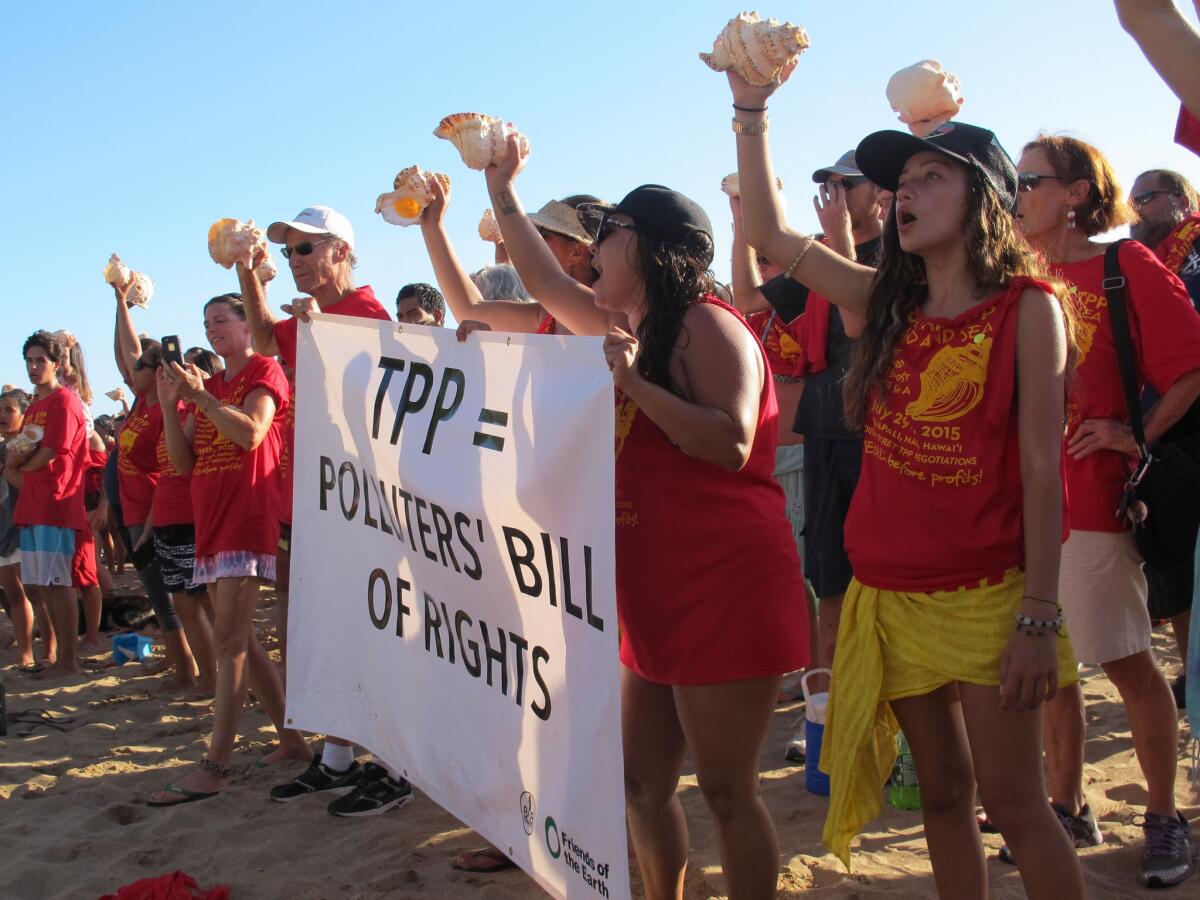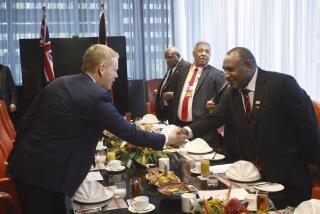U.S., Pacific Rim trade talks fail over dairy, sugar

Protesters holding conch shells line Kaanapali Beach in Lahaina, Hawaii, at a rally against the Trans-Pacific Partnership.
Reporting from Washington — Top trade officials for the U.S. and 11 other Pacific Rim countries on Friday failed to conclude a major free-trade agreement -- a setback for President Obama and his bid to clinch a deal that has been marked by repeated challenges at home and abroad.
Expectations were high that this week’s meetings in Hawaii would yield a final agreement on the Trans-Pacific Partnership, which has been years in the making, but negotiators were unable to resolve differences over such long-standing issues as market access for dairy and sugar.
“After more than a week of productive meetings, we have made significant progress and will continue work on resolving a limited number of remaining issues,” read a joint statement from trade ministers of Australia, Brunei, Canada, Chile, Japan, Malaysia, Mexico, New Zealand, Peru, Singapore, the United States and Vietnam.
The statement issued late Friday added that “we are more confident than ever that TPP is within reach,” but it did not indicate when negotiators would meet again.
Obama’s top trade official, Michael Froman, noted for example that they had closed the gap on intellectual property rights -- one of a number of areas involving commerce and investment, also including e-commerce and state-owned enterprises, for which the Trans-Pacific Partnership is aiming to set high-level standards and rules.
But negotiators this week couldn’t get past traditional trade issues involving sensitive products. Dairy was a key stumbling block, officials said, with Canada reluctant to bend to pressure from the U.S. and New Zealand to open up its protected dairy industry. Meanwhile, the U.S. was feeling heat from Canada and Australia to allow more sugar imports.
The Obama administration wants to wrap up negotiations as soon as possible so that the trade agreement, always a hot political issue, can be taken up by Congress before the 2016 presidential campaign gets into full swing and creates potentially more complications.
“No deal means the TPP is thrown into the political maelstrom of the U.S. presidential cycle,” said Lori Wallach, global trade director for Public Citizen, which has sharply criticized the Trans-Pacific Partnership as bad for American jobs and incomes.
Many leading Democratic lawmakers remain wary of the proposed trade pact. In Maui to observe the talks, Rep. Sander Levin (D-Mich.) said in a statement: “It is wise that the administration did not decide to get a deal done in the Trans-Pacific Partnership negotiations this week, as many key issues remain outstanding while others remain on the wrong track.” Among other things, he cited labor laws and access to affordable medicine.
Business groups and other supporters of the deal have argued that a trade pact covering 40% of the global economy will be good for the U.S. economy and workers alike. On Friday, they urged negotiators to press ahead to forge a comprehensive agreement.
“With the potential to significantly expand U.S. trade and investment ties with the Asia-Pacific region, each step toward completing this agreement is a step in the right direction,” said Bill Reinsch, president of the National Foreign Trade Council.
More to Read
Sign up for Essential California
The most important California stories and recommendations in your inbox every morning.
You may occasionally receive promotional content from the Los Angeles Times.











